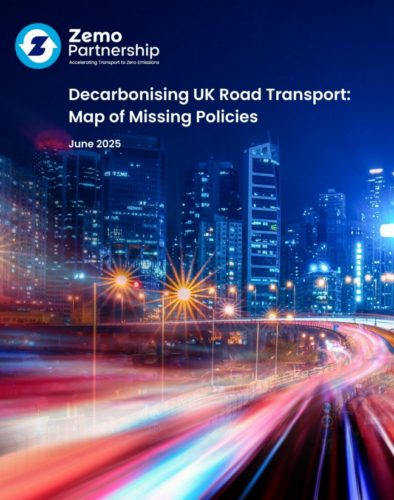
The Zemo Partnership has launched a new report describing the policies needed to accelerate the UK’s transition to net zero transport alongside a Zemo-convened parliamentary roundtable event in Westminster where cross-party MPs and Lords, including members of both the Transport and Business and Trade Committees, will discuss the report’s recommendations.
Zemo’s ‘Decarbonising UK Road Transport: Map of Missing Policies’ has been supported by the European Climate Foundation (ECF) and builds on the foundations provided by the Delivery Roadmap for Net Zero Transport which Zemo published in December 2024. The work reinforces Zemo’s efforts to achieve a more urgent, comprehensive and integrated approach to delivering net zero transport in the UK.
Zemo’s Map of Missing Policies identifies specific policy proposals, breaking down road transport into sub-sectors of buses, coaches, cars, vans and commercial vehicles. Each section includes a summary of the current situation, active government policies and proposals for new policies to accelerate and coordinate the transition, alongside energy/fuel-specific and cross-cutting recommendations.
For buses, those recommendations include the phase-in of a higher basic BSOG rate for electric buses, and to simultaneously taper it for existing diesel models until 2032, the creation of a new capital funding stream to ensure the distribution of infrastructure funding to smaller operators, and that Traffic Commissioners could restrict the purchase of new diesel buses by attaching conditions to operating licences, requiring operators to transition to zero-emission vehicles within a specific timeframe.
For coaches, Zemo says that there is a need to work towards a realistic end-of-sale date for new non-zero-emission coaches as the first step in a broader zero emission coach strategy, and to develop an initiative for the coach sector modelled on the Zero Emission HGV and Infrastructure Demonstrator Programme (ZEHID) to identify the most suitable technologies for coach operations and trial opportunities for innovation, as well as to consider using grant or other funding to support the growth of the zero-emission coach market once more models of electric or hydrogen coach are available to purchase.
Commenting on the report’s publication, Zemo’s Acting Managing Director Jonathan Murray said: “UK transport’s transition to net zero is well under way, though progress is uneven across the sector. There are still many specific hurdles that these policy prescriptions seek
to address as we accelerate into the delivery phase of transport decarbonisation. What gives these policy prescriptions relevance
and legitimacy is the fact that they have been scrutinised by such a wide cross-section of industry and academic experts, many of them Zemo Partnership members.”
Neil Stockley, Zemo Head of Public Affairs and the report’s author, said: “The UK’s road transport landscape is changing dramatically in a short time-frame. It’s vitally important that policy development keeps pace with this changing landscape to help ensure that the UK’s net zero transport industry continues to thrive and can contribute as much as possible to the UK’s economy and future prospects. I’d like to thank the many industry leaders and associated experts who have contributed their time and energy to helping Zemo complete this important work.”

